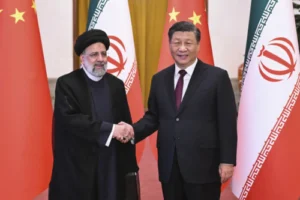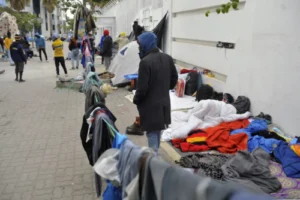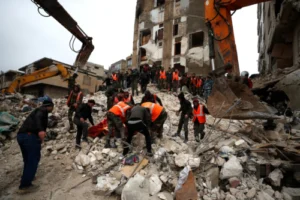
The National Interest Foundation Newsletter
Issue 183, March 17, 2023
Welcome to our NIF Newsletter. In this week’s headlines: we analyze the recent deal between Iran and the Gulf Cooperation Council brokered by China and China’s growing presence in the Middle East, look into the rise in racially motivated attacks in Tunisia, and examine the criticisms levied against Syria and Turkey for their slow response to the earthquake.
Articles by Breje Khan-Williams; Edited by Jacob Van Veldhuizen
China Expands Presence in the Middle East

China is becoming more active in the Middle East, marking the beginning of a shifting dynamic in the region. (Photo from AP)
China Continues to Expand Presence in the Middle East as they Announce they are Holding a Summit Between Iran and the Gulf Cooperation Council
China’s recent involvement in mediating an agreement between Iran and Saudi Arabia has been seen by analysts as a sign of a “changing global order.” Following talks in Beijing on Friday, Saudi Arabia and Iran agreed to restore diplomatic ties and reopen their embassies within two months, while also affirming the “respect for nations’ sovereignty and the non-interference in states’ internal affairs.” China’s top diplomat, Wang Yi, played a key role in the negotiations, with Iranian state media publishing pictures and videos of him standing between Ali Shamkhani, secretary of the Supreme National Security Council of Iran, and Musaad bin Mohammed al-Aiban, Saudi Arabia’s national security advisor. Wang emphasized China’s responsibility as a large country and its commitment to playing a positive role in resolving conflicts. The resumption of diplomatic ties comes after a history of geopolitical conflict between the two countries, with both sides supporting opposing factions in various Middle Eastern conflict zones. While discussions between authorities in Iraq and Oman have been ongoing since 2021, no agreements have been reached yet. According to Robert Mogielnicki, a senior resident scholar at the Arab Gulf State Institute in Washington, DC, China is taking a more active role in the region and is well-positioned to mediate an agreement between Iran and Saudi Arabia, particularly as the United States and Iran do not have particularly cordial relations. Mogielnicki further explained that China has not committed to any specific conclusion, making it a low-risk and high-reward venture. The better diplomatic relations between Saudi Arabia and Iran will decrease regional tensions and the likelihood of confrontation, which is advantageous not only for China but also for the United States and other regional players, Mogielnicki added. Additionally, as China imports energy from Iran and Saudi Arabia, it has a clear interest in strengthening ties and maintaining stability in the region, said Sina Toossi, a non-resident senior fellow at the Center for International Policy in Washington, DC. The 2019 Houthi attack on Saudi oil facilities temporarily halted the nation’s oil output, leading to a global oil price increase of over 14% over the weekend, the largest surge in over a decade. According to Toossi, the worst-case scenario for China would be if a conflict in the Persian Gulf affects its economic and energy security.
According to Trita Parsi, executive vice president of the Quincy Institute, the United States’ credibility as a mediator is waning as it continues to take sides in regional conflicts and implements divisive policies. In contrast, China has refrained from taking sides in the Saudi-Iran crisis and is therefore well-positioned to act as a peacemaker. This achievement comes as reports emerge of increasing tensions between Israel and Iran, with the US historically supporting Israel and Saudi Arabia against Iran. This shift in global order suggests that nations such as Saudi Arabia now have alternative choices for political and economic partnerships. As a crucial source of trade, politics, and military ties, China and Russia are attractive partners for these nations. Sina Toossi, a non-resident senior fellow at the Center for International Policy, believes that the Saudi Crown Prince’s original confrontational policy towards Iran has given way to a desire for coexistence, particularly as the U.S.’s support becomes less unconditional. However, it is important to note that the recently normalized relations between Iran and Saudi Arabia will not necessarily resolve their enormous geopolitical disagreements, as both countries have taken sides and fought proxy battles in numerous Middle Eastern conflict zones. Nevertheless, there is now an opportunity for expanded and prolonged communication that might help bridge these disparities, as mentioned by Toossi.
China’s diplomatic gains in the Middle East are indicative of a changing global order that presents new opportunities and challenges for regional players. China’s role as a mediator in resolving conflicts in the region highlights its growing presence and interest in the Middle East. As China continues to strengthen its ties with the region, it may play a more prominent role in promoting stability and resolving conflicts, which will benefit everyone involved. In the wake of Saudi Arabia’s oil well bombing, the United States, under former President Donald Trump, had made it clear that it would not engage in any wars in the Middle East, thereby reducing its credibility as a mediator in the region. While the Biden administration tried to restore its relationship with regional allies, its further involvement in the conflicts between Iran and Saudi Arabia has made it more difficult for the U.S. to play a peacemaking role, allowing China to take advantage of the situation and extend its reach into the region. Despite their recently restored diplomatic ties, Iran and Saudi Arabia still have significant geopolitical differences, and it will take prolonged communication to bridge these disparities. The trilateral statement released on Friday mentioned the security and cooperation agreements signed by the two countries in 2001 and 1998, suggesting that they are trying to rebuild their spirit of cooperation, which necessitated economic, security, political, and high-level diplomatic collaboration.
China’s involvement in mediating between Iran and Saudi Arabia is unusual given its traditionally low political profile in such matters. However, China’s comprehensive strategic partnership with both nations, its increasing dependence on Middle Eastern energy sources (with half of its oil coming from the region), and its interest in promoting stability and peace make its involvement understandable. China’s growing trade and investment in the region, including through its Belt and Road Initiative, also gives it an economic and political component as an outside influence in Middle Eastern diplomacy. While some may view China’s actions as a means to hedge against potential U.S. sanctions on its oil supply, others see it as an opportunity for better foreign relations and multi-polarity in the region. However, the deal could hinder efforts to promote democracy in the Middle East and potentially give China a greater security role in the region. As new approaches arise, it will be important for foreign relations to adapt and find new ways to bring about diplomatic solutions from the U.S.
Racially Motivated Attacks Increase in Tunisia

As racially motivated attacks increase, many migrants take shelter outside of international organizations for protection. (Photo from AP)
Racist Attacks have Increased in Tunisia Following a Speech by President Kais Saied
The recent wave of racial violence in Tunisia is deeply concerning and highlights the need for urgent action to address the root causes of this phenomenon. Attacks against Black African migrants, asylum seekers, and refugees have been on the rise since President Kais Saied’s speech on February 21, 2023, in which he accused African migrants of plotting to turn Tunisia more African and less Arab. This speech has fueled racist sentiments among Tunisians, resulting in violent attacks, robberies, and vandalism against Black African foreigners. Human Rights Watch has reported that President Saied’s efforts to alleviate the harm caused by his speech have fallen short of what is needed to stop the spike in violence. While some measures have been announced, such as the immediate release of those detained without cause and a review of individual cases to ensure due process for everyone arrested, more needs to be done to address the underlying causes of this phenomenon.
Many Black African refugees, asylum seekers, and foreigners who have recently become homeless continue to camp out in front of the offices of international organizations because they feel safer there from these attacks and arbitrary detentions than elsewhere in Tunisia. Some feel as though they need to avoid public view elsewhere. It is essential that the Tunisian government takes concrete steps to protect the rights and dignity of these vulnerable populations and ensure that they have access to adequate housing and basic services. A rhetoric of demonizing any group of people is objectively wrong and people should not have to worry about physical appearances to feel accepted and safe. The rise in racial attacks against Black African foreigners is alarming and requires a strong response from the Tunisian government. Arbitrary detentions, evictions, and employment terminations must cease, and those responsible for racist attacks and abuses should be swiftly investigated and held accountable. Throughout history, there have been numerous instances where countries or political parties have blamed minority groups for socio-economic and political decline as a means to deflect responsibility and maintain power. The government must also work to address the underlying social and economic issues that fuel racist sentiments, including poverty, unemployment, and social inequality.
There are clear similarities between the situation of racial violence in Tunisia and the erosion of Tunisia’s democratic institutions under President Kais Saied. In both cases, the government’s actions have been criticized for limiting freedoms and targeting opposition figures. President Saied’s moves to centralize power and limit the power of other branches of government have created a climate of fear and uncertainty in the country, much like the increase in racial attacks against Black African migrants. In both situations, there is also a concern that short-term stability is being prioritized over long-term democratic gains. The government’s crackdown on dissent and opposition figures is seen as a dangerous course of action that threatens the country’s democratic progress. Similarly, the rise in racial attacks against Black African foreigners is viewed as a threat to Tunisia’s social cohesion and democratic values. Both situations highlight the importance of a genuine commitment to democracy and human rights and the interconnectedness of these two ideas. The erosion of democratic institutions and the increase in racial violence both require a strong response from the government and the international community. It is important that Tunisia’s government realizes the dangers of its current course and takes steps to reverse its repressive policies. It is also essential that the Tunisian government takes steps to promote understanding among all races and promote tolerance and respect for diversity. Education and awareness-raising campaigns should be implemented to promote intercultural dialogue and combat prejudice and discrimination. The international community has an important role to play in supporting Tunisia in its efforts to address the root causes of racial violence and promote understanding among all races. Governments, civil society organizations, and international organizations should use their influence to pressure the Tunisian government to take action to protect the rights of Black African migrants, asylum seekers, and refugees in Tunisia. They should also support efforts to promote intercultural dialogue and combat prejudice and discrimination.
In conclusion, the escalating racial violence in Tunisia is a matter of grave concern, and urgent action is needed to address the root causes of this phenomenon. The Tunisian government must take concrete steps to protect the rights and dignity of Black African migrants, asylum seekers, and refugees in Tunisia and promote understanding among all races. The international community must also remain vigilant to what is happening in Tunisia and support those who are fighting for their political rights, freedoms, and dignity. The success of Tunisia’s democratic transition is too important to be sacrificed in the name of short-term stability. It is crucial that Tunisia’s government reaffirms its commitment to the protection of the rights of all its citizens, regardless of their race or ethnicity. Only by working together can Tunisia put an end to this wave of violence and promote tolerance and respect for diversity.
Earthquake Response in Turkey and Syria

Recovery efforts have been slow, causing many to criticize the governments of Turkey and Syria. (Photo from AP)
Turkey and Syria Continue to Receive Criticism over Slow Response to the Earthquakes
The recent earthquakes in Syria have caused tremendous devastation and have highlighted the failures of the international community in providing timely and effective aid to those affected. The UN-appointed investigative committee has now criticized the slow response to the earthquakes and identified several actors, including the UN itself and the Syrian government, for their role in the delay. The slow military response in aid from Turkey’s military has also raised concerns about the government’s ability to mobilize and use the military in search and rescue efforts. The earthquakes, which struck Syria and Turkey last month, claimed the lives of tens of thousands of people, with the majority of the casualties in Syria in the rebel-held northwest close to the Turkish border. Despite the scale of the disaster, humanitarian aid was slow to arrive, leaving Syrians feeling abandoned and ignored by those who were meant to protect them. According to the commission’s chair, Paulo Pinheiro, there was a general failure on the part of the government and the international community, including the UN, to quickly direct life-saving assistance to Syrians in the greatest need. The slow response to the earthquakes is a tragic reflection of the ongoing conflict in Syria, which has been raging since 2011. With over 500,000 people dead and almost half of Syria’s pre-war population ejected from their homes, the situation in Syria remains one of the most pressing humanitarian crises of our time. The commission’s findings suggest that the international community is failing to provide the necessary support to those who need it most, leaving them vulnerable to further suffering and devastation.
One of the key actors identified by the commission was Turkey’s military, which has been criticized for its slow response in providing aid to Syrians affected by the earthquakes. Given Turkey’s close proximity to Syria, it is concerning that the military was not able to provide more timely and effective support to those in need. While Turkey has taken in millions of Syrian refugees throughout the conflict, the slow response to the earthquakes raises questions about its commitment to providing ongoing support to those affected by the crisis. According to reports, the military was not one of the primary reaction teams in Turkey’s disaster response strategy. This lack of proper engagement was attributed to the country’s poor history of civilian and military relations. Some opposition figures even speculated that the government limited the use of the military out of concern for an eventual coup against the government. The Humanitarian Assistance Brigade, a military search and rescue unit, was sent to the disaster area in the early days after the earthquake, but the force consisted of little more than 400 personnel. The military actively sent ships to provide medical aid and deployed its air force to transport relief. However, the military reaction in the earthquake zone differed depending on the location, and there were technological issues that slowed down the response in addition to the alleged rivalry between the interior and defense ministers. The slow response from Turkey’s military has also raised concerns about the country’s crisis management strategies, particularly as it makes up the second-largest ground force in NATO. The government’s ability to coordinate and mobilize the military during disasters needs to be reevaluated to ensure that aid reaches those in need as quickly as possible and the delays in aid are not repeated.
The UN’s own failures in responding to the earthquakes are also cause for concern. While the UN has been working to provide humanitarian aid to Syrians throughout the conflict, the commission’s findings suggest that more needs to be done to ensure that aid is delivered quickly and effectively. The UN must take a more proactive approach to identifying and addressing the barriers that prevent aid from reaching those who need it most. The situation in Syria is complex and challenging, but that is no excuse for inaction. The international community must come together to provide the support Syrians need to rebuild their lives and communities. This requires a comprehensive ceasefire that is fully respected and safe access for aid workers. The recent earthquakes have shown that the people of Syria cannot wait any longer for the help they so desperately need. It is time for the international community to step up and take action.
